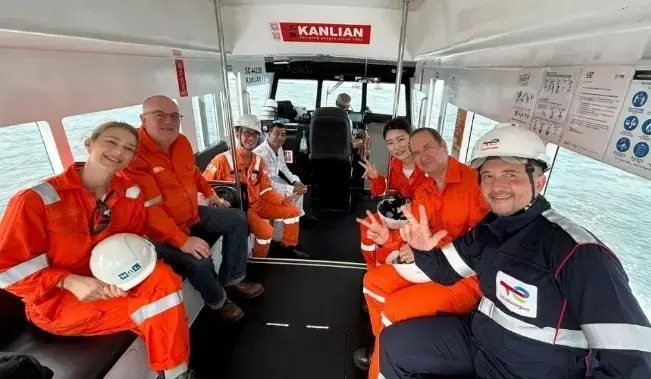Blog Article - Jun 26, 2024

TotalEnergies Marine Fuels’ Head of HSE & Technical department, Gerard Oberti, spent three years as an incident investigator, witnessing the sometimes-horrific aftermath of industry accidents. Before that, he cut his teeth in aviation where focus on safety has led other sectors. So, there is no doubt he takes safety as seriously as anyone could. His latest challenge? To ensure the adoption of clean and new, lower-carbon fuel solutions by the shipping industry is done in a careful, measured way without incident.
“It doesn’t sound exotic, but it was for me!” Gerard reminisces about his first assignment for TotalEnergies over 20 years ago. “I came from South of France so working in Watford was a real culture shock.”
The assignment in the industrial English town was formative. As an aviation fuel terminal manager arriving in the wake of an oil depot fire that shocked the industry, Gerard’s first lessons in his career were dominated by safety – the culture, processes, regulations and how to embed them in everyday operations.
Soon, more challenging postings followed in Panama and Kenya, as well as countless work trips to over 50 countries, during which Gerard saw firsthand many approaches to running operations.

“I’ve been to very fatalistic kind of countries with a very reactive approach to safety, so it was a challenge sometimes to have risky operations in those countries but it was also rewarding to improve those operations,” he says.
Now, as head of Health, Safety, Environment (HSE) & Technology for TotalEnergies’ Marine Fuels entity, he leads a small team spread across Paris, Singapore and Geneva, which ensures safety is woven into all aspects of the business unit’s work. It supports current operations, underlying the safe conduct of bunkering operations and new projects, by drawing up detailed risk assessments for potential operations in new locations.

Gerard (middle) with Denis Bonhomme, Global Sales and Business Development Director (right) and Glenn Wong, Solutions Engineer for Alternative Fuels Bunkering (left) during a safety contract owner meeting with a partner.
The team also supports the Strategy Department, which is developing TotalEnergies Marine Fuels’ multi-fuels approach to help the shipping industry to decarbonize. This entails very involved assessments of developing future fuels at scale - such as green ammonia and green methanol - which are promising clean alternatives to marine fuel oil but come with their own safety challenges.

Gerard (first from right) onboard a pilot boat to inspect TotalEnergies Marine Fuels’ deployed LNG supply vessel, the Brassavola, with Frederic Meyer, Head of Strategy and Projects Department (second from right), Glenn Wong (third from left), Eunseo-Ruby Jeong, Bunker Operator (third from right), Philippe Lemaire, TotalEnergies’ Marketing & Services Branch Toxicologist (second from left) and Nina Molina Kjeholt, representative of Mitsui O.S.K. Lines, Ltd Asia (first from left).
Managing demand, managing risks
Decarbonization in the shipping industry is accelerating – this can be seen in the uptake of cleaner fuels such as LNG and biofuels, in the development of future alternative fuels and in the new vessel order book. LNG bunkering, in particular, has increased markedly in recent months as prices have fallen. But this is also a challenge, Gerard notes.

Gerard (second from right) at the Hutchinson factory (manufacturer of GTT and part of TTE Company), located South of Paris, together with Henri Orengo, HSEQ Coordinator (first from right). They inspected the sample of the GTT Triplex Membrane that is installed on our LNG Bunker Vessels, Gas Agility, Gas Vitality and Brassavola.
“We must understand how we can meet the demand, which is growing, and manage the risk, which is also growing. There are hundreds of crews that need to learn how to safely perform LNG bunkering operations. Our deployed bunkering vessels, Gas Agility, Gas Vitality and Brassavola, are run by experts and they are going the extra mile by providing online training ahead of bunkering operations.”
“We’re having this discussion with our clients and are coming with an action plan. I was also at an SGMF board meeting recently where we discussed standardised crew training,”Gerard said, referring to the Society for Gas as a Marine Fuel, an industry group focused on bunkering safety.
It is here that Gerard draws on his experience, arguing that shipping could learn from aviation, which has the same standardized procedures and approaches for all its planes, in particular, due to the presence of many common refuelling facilities between industry actors. And he draws on his memories too.
“I spent three years doing major incidents investigations and I’ve seen many scenes after incidents and these are not good memories. So, I can tell you, I have this in mind, I know what can happen and my team and I won’t let these incidents happen in TotalEnergies Marine Fuels’ operations, anywhere, at any time.”